Chennai, Tamil Nadu – July 2025
In a significant development concerning Tamil Nadu education sector, Dr. E. Balagurusamy, the former Vice-Chancellor of Anna University, has written a detailed letter to the Chief Minister of Tamil Nadu, urging him to bring much-needed reforms in the state’s higher education system. His letter raises key concerns around governance, legal compliance, leadership vacancies, and the quality of education being provided in several deemed universities.
the issues raised by Dr. Balagurusamy, their legal and academic implications, and his recommendations for reviving the state’s higher education standards.
Background: The Changing Higher Education Landscape in Tamil Nadu
Tamil Nadu has long been considered one of India’s leaders in higher education. It is home to a wide range of state universities, deemed universities, and engineering institutions. However, over the past few years, various controversies have emerged around how universities are managed—particularly when it comes to the appointment of Vice-Chancellors, state interference in deemed universities, and admission and fee regulations.
the letter by Dr. E. Balagurusamy has reignited the conversation on how to preserve both academic freedom and legal compliance.
Core Issues Highlighted by the Former VC
1. State Regulation of Deemed Universities
Dr. Balagurusamy strongly opposed the recommendation made by a high-level committee led by Justice D. Murugesan that suggests state control over admissions, fee structures, and reservation policies in deemed universities. He emphasized that such institutions are governed under Section 3 of the UGC Act, 1956, and are regulated solely by the University Grants Commission (UGC), not state governments.
He pointed out that trying to impose state control over deemed universities would violate constitutional and legal boundaries. Several deemed universities, though many are functioning well, are also accused of lowering academic standards and admitting underqualified students. However, he argues that solutions should lie within the UGC framework rather than new state laws.
2. Flawed Vice-Chancellor Appointment Process
Another major concern raised by Dr. Balagurusamy is the state’s amendment to the process of appointing Vice-Chancellors in state universities. The Tamil Nadu government passed a law that removes the requirement to include the UGC Chairperson’s nominee in the search committee. This, according to Dr. Balagurusamy, directly violates UGC Regulation 7.3 and multiple Supreme Court rulings.
He stressed that any Vice-Chancellor appointment done without following UGC norms is legally invalid or “void ab initio,” meaning it is invalid from the very beginning.
3. Leadership Vacancies Across Universities
Currently, several major universities in Tamil Nadu—including Anna University, University of Madras, and Bharathiar University—are functioning without permanent Vice-Chancellors. Dr. Balagurusamy argues that such leadership gaps result in:
-
Delayed reforms and projects
-
Administrative confusion
-
Lack of policy implementation
-
Accreditation and ranking issues
He urged the government to act quickly and form valid search committees with proper representation from the UGC to fill these vacancies.
Legal Dimensions: Why UGC Rules Must Be Followed
Dr. Balagurusamy reiterated that higher education is part of the Concurrent List in the Constitution. While states do have power, the central law (UGC Act) prevails in case of any conflict, under Article 254 of the Constitution.
He cautioned the state against passing education laws that contradict central regulations. A recent Public Interest Litigation (PIL) in the Madras High Court has already challenged the state’s law on VC appointments. Experts believe that the court may strike down the state law in favor of the UGC’s authority.
Recommendations by Dr. Balagurusamy
To address these concerns and improve the education system, Dr. Balagurusamy made the following recommendations:
1. Respect UGC Guidelines
All institutions, whether state or deemed universities, must follow UGC regulations strictly. Attempts to bypass these laws will result in legal disputes and damage the credibility of Tamil Nadu’s education system.
2. Revise Search Committees
All Vice-Chancellor search committees must include the UGC Chairperson’s nominee, as per UGC norms. This will ensure fair and transparent selection of university heads.
3. Appoint Vice-Chancellors Without Delay
The government must form legally valid committees and complete the appointment process swiftly. Without strong leadership, universities will continue to suffer from academic and administrative stagnation.
4. Ensure Quality Over Control
While the government should monitor education quality, it should not try to control academic institutions in ways that go beyond legal boundaries. Instead, it should work with the UGC and universities to promote innovation, research, and quality teaching.
Why This Letter Matters
Dr. E. Balagurusamy is not just a former VC—he is a respected academic and educationist who has played a key role in shaping higher education in Tamil Nadu. His concerns carry weight and are rooted in deep legal and administrative knowledge.
His letter also shines a spotlight on the larger debate: Should states interfere in university functioning, or should universities maintain autonomy under UGC guidance?
This is a critical question for not only Tamil Nadu but for all Indian states, especially at a time when education policies are evolving under frameworks like the National Education Policy (NEP) 2020.

Conclusion: The Way Forward for Tamil Nadu’s Universities
Tamil Nadu’s higher education institutions have the potential to become global centers of learning and innovation. But this will only happen if governance is legally sound, leadership positions are filled, and academic freedom is protected.
The government must focus on collaboration rather than control, and universities must commit to maintaining high academic standards. By addressing the issues raised by Dr. Balagurusamy, Tamil Nadu can reclaim its leadership position in India’s education landscape.


